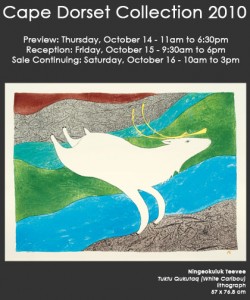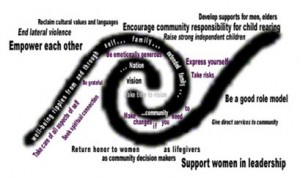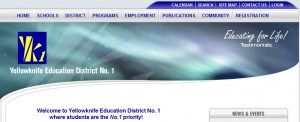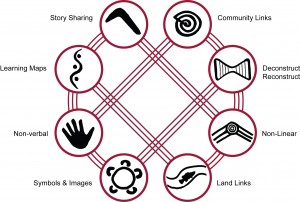Public Ethics Radio – Episode 13: Sarah Holcombe on Indigenous Intellectual Property Rights
This Public Ethics Radio clip examines questions around Australian Indigenous knowledge management, intellectual property rights, and research ethics. The guest speaker is social anthropologist Sarah Holcombe who is a research fellow at the National Centre for Indigenous Studies at the Australian National University. The audio clip is 32 minutes long.
Visit Dr. Holcombe’s website: http://law.anu.edu.au/ncis/holcombe.html
November 28, 2010 No Comments
Changing Art in the North: A reflection of social and environmental realities
Since the 1950s, Cape Dorset or Kinngait, the “Capital of Inuit Art” has been a centre for drawing, printmaking and carving. Today, printmaking and carving are the community’s main economic activities. But some older artists along with younger ones are creating art of a different nature, art that is less known and less valued in southern Canada – art that reflects the artists’ changing social and environmental context. The video “The New Raw” focuses on this situation.
The New Raw
Video 11 min. Radio Canada International (RCI)
Interviews with Cape Dorset artists and footage of their art inform the viewer of the diversity of northern art. The viewer hears that southern Canadian art lovers still seek and maintain the demand for Arctic art with traditional images – the animals of Inuit legends – but there is a growing number of Cape Dorset artists who produce art reflecting the social and environmental change of their day-to-day realities.
http://eyeonthearctic.rcinet.ca/en/video/video-categories/viewvideo/59/art-and-culture/the-new-raw
See also these RCI videos:
The Rebel – Jutai-Toonoo, 26 min.
http://eyeonthearctic.rcinet.ca/en/video/viewvideo/60/art-and-culture/the-rebel-jutai-toonoo
The Up-And-Comer – Ningeokuluk Teevee, 8 min.
http://eyeonthearctic.rcinet.ca/en/video/viewvideo/64/art-and-culture/the-up-and-comer-ningeokuluk-teevee
The Carver – Toonoo Sharky, 8 min.
http://eyeonthearctic.rcinet.ca/en/video/viewvideo/61/art-and-culture/the-carver-toonoo-sharky
The Printer – Niveaksie Quvianaqtuliaq, 7 min.
http://eyeonthearctic.rcinet.ca/en/video/viewvideo/62/art-and-culture/the-printer-niveaksie-quvianaqtuliaq
Note: In this video we see the making of the print of “Stiletto,” an example of a more modern stone cut art piece by Kavavaow Mannomee.
November 19, 2010 No Comments
Aboriginal Digital Opportunities
Greenall & Lizides (2001) Aboriginal Digital Opportunities: Addressing Aboriginal Learning Needs through the Use of Learning Technologies. The Conference Board of Canada.
This report broadened my perspective and knowledge about the use of computer technology in Aboriginal communities across Canada. It outlines benefits and challenges, and tries to provide Aboriginal perspectives on increasing digital opportunities. The document is based on a research study involving 10 communities selected to “represent a cross-section of Aboriginal communities ranging from urban to rural and from north to south.” Detailed description of each case study is provided in Appendix 1.
http://www.hrsdc.gc.ca/eng/hip/lld/olt/Skills_Development/OLTResearch/aborig_e.pdf
November 18, 2010 No Comments
Tri-Council Policy Statement: Ethical Conduct for Research Involving Humans
This Government of Canada Panel on Research Ethics website (Modified: 2010-03-22) Tri-Council Policy Statement: Ethical Conduct for Research Involving Humans, focuses on research involving Aboriginal peoples. Due to the fact that the agencies responsible for the formation of this policy statement feel that that there have so far been insufficient discussions with representatives of the Aboriginal communities involved, or with the various organizations or researchers involved, the agencies have decided that it is not yet appropriate to establish policies in this area. The text drafted to date (Section 6) builds on literature on research involving Aboriginal Peoples in Australia and abroad, and is intended to serve only as a starting point for discussions around a policy statement.
I find this website a somewhat hopeful government document for several reasons. For example it:
- Respectfully acknowledges the unique cultures of Canada’s Aboriginal peoples and the fact that specific policy language needs to be crafted in order to accommodate these needs.
- Describes clearly some of the past research techniques that have impacted Aboriginal peoples and “historical reasons why Indigenous or Aboriginal Peoples may legitimately feel apprehensive about the activities of researchers” and the subsequent harm that has resulted.
- States the integral need to include Aboriginal groups in the formation of a complete policy statement.
http://www.pre.ethics.gc.ca/eng/policy-politique/tcps-eptc/section6-chapitre6/
November 7, 2010 No Comments
Globalization, Knowledge Economy and the implication for Indigenous Knowledge
This International Review of Information Ethics paper describes how globalization and the knowledge economy have affected Indigenous Knowledge. Globalization and the knowledge economy have both exposed IK for the potential and actual value it has yielded to the world’s most powerful multinational corporations and at the same time, negated IK by viewing it as untried and untested until it is validate by Western technology. The paper goes on to describe some of the many ways in which Indigenous knowledge has been commercialized and used in inappropriate ways. For all of these reasons, the author concludes that Indigenous knowledge needs to be protected. Several means of protection were explored including:
– enacting suigeneris laws
– documenting IK
– seeking contract licensing
The paper then goes on to describe several specific initiatives in the developing world that are aimed at providing the much needed intervention to protect and promote IK in the face of globalizations.
www.i-r-i-e.net/inhalt/007/06-moahi.pdf
November 6, 2010 No Comments
Indigenous Knowledge: Foundations for First Nations
This well-written and thought provoking essay outlines the author’s view of the “fundamental assumptions underlying modern public school education” in Canada. She describes a historical perspective where education and knowledge were automatically assumed to be a positive liberator of individuals, Aboriginal and non-Aboriginal alike, and a necessary step towards “and intrinsic to the progress and development of modern technological society.”
However, in citing examples where this has not been the case for Aboriginal learners, and in fact that the experience has been the polar opposite for these learners, she uses a phrase “cognitive imperialism” which describes a form of cognitive manipulation used to disclaim other knowledge bases and values. After further elaborating on cognitive imperialism, she goes on to describe her remedy for the situation which includes “a serious and far-reaching examination of the assumptions inherent in western knowledge, science and modern educational theory.”
Note: This essay is part of a study that responds to the Government of Canada’s working partnership with First Nations to improve the quality of Aboriginal life and education in Canada through research conducted with the Education Renewal Initiative.”
www.win-hec.org/docs/pdfs/Journal/Marie%20Battiste%20copy.pdf
November 6, 2010 No Comments
Living Well: Aboriginal Women, Cultural Identity and Wellness
This research project by an Aboriginal Women’s Health Research Committee, supported by Prairie Women’s Heath Centre of Excellence (PWHCE) was designed to advance the current understanding of the positive impact of cultural identity on the wellness of Aboriginal women in Manitoba. In addition, an additional objective was to extend understanding of the ways that Aboriginal women have sought to heal themselves and their families through cultural values, teachings and knowledge.
The study included a literature review of the current research followed by group discussions and individual interviews with the women in the study. The study concluded that the women in the study take care of their physical and emotional health by maintaining balance between all aspects of their lives, including the physical, mental, emotional and spiritual. The approach is very reminiscent of the medicine wheel approach to holistic health. The findings concluded that the women’s identities are inseparable from their family, history, community, place and spirituality, and understood in the context of their whole lives. The approach/findings were reminiscent of Lee Brown’s ideas around the emotional health and the whole person.
October 18, 2010 No Comments
Yellowknife Education District No. 1
As a means to better understand how culture-based education is being implemented, I researched the Northern community of Yellowknife to view their school district page. The district Website reports that Aboriginal students account for approximately 25% of enrolment in Yellowknife Education District No. 1 and that they are spread out across eight schools.
The school district lists their YK1 Strategic Direction as:
To ensure that students and staff are engaged in, and value Aboriginal Language and Culture-Based Education.
The following strategic goals indicate how the strategic direction will be implemented:
- To support staff to integrate culturally relevant learning opportunities into instructional programming
- To build capacity to increase the human resource base for the instruction of Aboriginal Language and Culture-Based programs
- To develop and support programs that promote the social and emotional well-being of Aboriginal students
- To promote and support Aboriginal Language and Culture- Based Education for all students
- To strengthen relationships with the Aboriginal community
- To revise Board procedures for the delivery of Aboriginal Education
October 18, 2010 No Comments
Aboriginal children : the healing power of cultural identity
After viewing the Lee Brown video, I was particularly interested in reading more about linkages between cultural identity and educational success. During my reading I came across a Public Health Agency of Canada Website entitled: Aboriginal Children: the healing power of cultural identity.
This site describes several aboriginal initiatives across Canada that are working to promote cultural identity in Aboriginal children, the devastating effects of past injustices such as residential schools, how communities are working together to help restore identity, and the importance of elders to the processes. The site concludes byoffering the following list of suggestions aimed to foster a child’s sense of identity:
- Learn as much as you can about the specific culture of the child – its traditions, strengths and challenges. Aboriginal cultures are diverse (there are approximately 50 different Aboriginal cultural groups in Canada) and there is also diversity within each community.
- Try to balance the physical, mental, emotional and spiritual dimensions of the child.
- Support the child to learn and maintain his traditional language.
- Provide regular opportunities for her to take part in traditional activities. Fish, gather berries, prepare and eat traditional foods together.
- Provide regular opportunities for him to take part in community events. Attend ceremonial and ritual events.
- Encourage meaningful interaction with Elders from her community. Children can learn respect and wisdom from Elders.
- Support him to learn traditional stories and legends.
- Provide her with books, videos, traditional games, dance and music that reinforce her traditional, family and daily life.
- Speak frankly to him about discrimination.
- Network with other Aboriginal parents, colleagues and Elders to share experiences and ideas.
http://www.phac-aspc.gc.ca/dca-dea/programs-mes/aboriginal-autochtones-eng.php
October 18, 2010 No Comments
8 Ways
I came across this site while searching “aboriginal education”. It is a site designed and maintained by the Western New South Wales Regional Aboriginal Education Team and James Cook University in Australia. It is a pedagogical framework for teachers to be able to teach Aboriginal students in a meaningful way. It discusses and has resources about Aboriginal perspectives and how to include them into the core curriculum that is set by the school boards and governments.
October 11, 2010 No Comments




